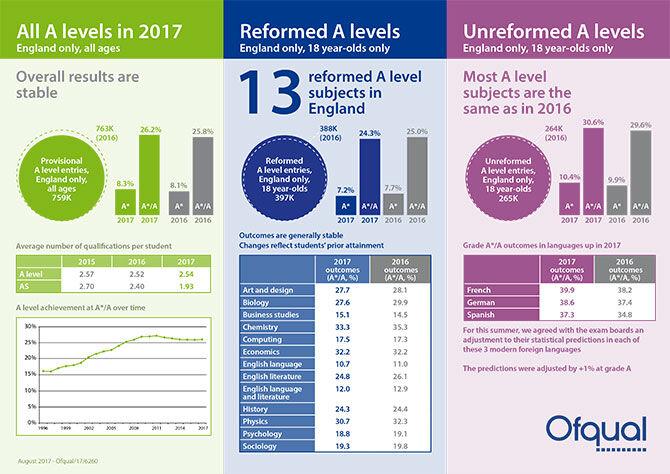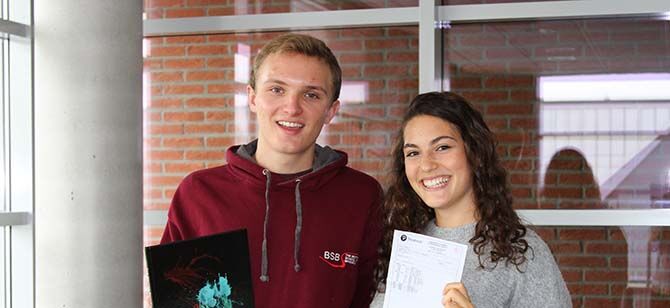A Level results 2017: students receive their grades
This year’s A Level results show an increase in entries in STEM subjects and in the proportion of top grades in French, German and Spanish. What does this mean for parents, students, and employers seeking talent?

 Nick Gibb, the Minister for School Standards, said, “Congratulations to everyone receiving their results today, which are the culmination of two years of dedication and hard work. We want everyone, regardless of background, to be able to fulfil their potential, and for many, A Levels are the pathway to a university degree.“The increase in entries to facilitating subjects – those that give students the greatest choice of options at university – mean even more young people will have access to all the opportunities higher education provides.”
Nick Gibb, the Minister for School Standards, said, “Congratulations to everyone receiving their results today, which are the culmination of two years of dedication and hard work. We want everyone, regardless of background, to be able to fulfil their potential, and for many, A Levels are the pathway to a university degree.“The increase in entries to facilitating subjects – those that give students the greatest choice of options at university – mean even more young people will have access to all the opportunities higher education provides.”STEM agenda flourishing
Because of their importance to employers needing to source talent with the skills required to grow their organisations and compete in an increasingly global marketplace, the STEM subjects – science, technology, engineering and mathematics – are a key focus across the Relocate media and the Relocate Awards, so it was good to see increasing entries to A Levels across these areas.“There has been a strong uptake in core subjects, such as maths, which continues to be the most popular A Level, with maths and further maths having nearly 25 per cent more entries than in 2010,” said Nick Gibb. “This, and increasing entries to science, technology, engineering and maths (STEM) subjects, bodes well for the economic prosperity of our country. It will help to grow our workforce in these sectors, allowing young people to secure well-paid jobs and compete in the global jobs market of post-Brexit Britain. “Increasing the number of girls studying STEM subjects has been an important objective of the government, so it is particularly pleasing to see that more young women are taking STEM subjects, and that, for the first time since 2004, there are more young women than young men studying chemistry. I hope everyone receiving their results will go on to successful careers.”Although maths continues to be the most popular subject at A Level, with 88,000 entries this year (a 3 per cent increase on 2016’s figure), almost three-quarters of students with a grade A*–C in GCSE maths choose not to continue studying the subject.This led the government to announce, in July, a £16 million investment in increasing the quality of teaching in post-16 maths, as part of a drive to see more students studying the subject after GCSE and ensure Britain’s future workforce could compete in the global marketplace post-Brexit.Following a review by Professor Sir Adrian Smith, vice-chancellor of the University of London, Nick Gibb set out a series of actions to increase participation.University acceptance numbers drop
UCAS, the body which oversees the application process to British universities, has congratulated the 416,310 students who have been accepted at UK universities and colleges so far this year.The number of students accepted is down by 2 per cent compared with 2016. This decrease is driven by a fall in acceptances of older students and applicants from the European Union, possibly as a result of Brexit uncertainties.The number of UK 18-year-olds gaining a place is similar to last year, at 201,270. It includes a record number (21,470) of applicants from the least-advantaged backgrounds. However, the most advantaged young people are still 2.4 times more likely to be accepted for university entrance.Although this year saw a 3 per cent fall in the number of EU students accepted, there was a 4 per cent rise in the number of international students.Congratulating all those who had achieved the A Level grades they had hoped for, Clare Marchant, chief executive of UCAS, had some encouraging words of advice for those who were disappointed with their results.“If you have not done as well as you had hoped, try not to worry,” she said. “You have plenty of options, and, every year, many people who have missed out on their grades find high-quality and rewarding courses through Clearing.“Make sure you take some time to think about what you want to do next, and seek advice from those who know you best – parents, teachers, and friends.“If you decide you want to start a degree this year, UCAS can offer all the support you need. You can search around 45,000 courses with Clearing vacancies on ucas.com – you’ll need to contact universities and colleges directly to discuss the courses you’re interested in before deciding if you want to accept an offer.”Also of interest:
- A Levels: the best fit for international pupils?
- IB vs A Level: what do university admissions officers think?
- Studying for success in the UK and the US
- Comparing the US and UK education systems
AS Level decline continues
The fall in the number of candidates taking AS qualifications gathered pace this year, with a 39.1 per cent drop in entries. This follows a 13.7 per cent drop in 2016. These figures are mainly driven by changes in England. Schools, colleges and students are making these choices across all subject areas, especially those that have already been reformed and are decoupled from the A Level in England.The decoupling of the AS and A Level qualifications is a significant driver in this change in England, but there may be other explanations, such as a switch to the Extended Project Qualification, which saw a 12.4 per cent increase year on year (35,608 to 40,013).However, the AS continues to be valued by many, with more than 700,000 entries this year.School results
Relocating parents and the employers and relocation professionals who support their moves will be delighted that UK schools with a reputation for welcoming international families and returning expatriates have produced another crop of strong results.Alice Smith School
Almost a third of graduating students at the Alice Smith School achieved all straight A*/A grades, one student achieving 2A* 2As, four students 1A* 3As, seven students achieving 2A* 1A, eight students attaining 1A* 2As and two students with 3As.Over 80 per cent of the students secured places at UK Russell Group and top world ranking universities including the University of Cambridge, St. Andrews University, University of Bath, McGill University, University of British Columbia and the University of Hong Kong.Bromsgrove School, Worcestershire
Bromsgrove School's 220 upper-sixth leavers took, in total, 733 subject qualifications this year. More than a quarter of all results achieved the equivalent of an A* and just over three-fifths achieved at least an A grade. The A*–B percentage achieved was 80 per cent. Six pupils achieved more than five A grades and 20 achieved four or more A grades, with 43 gaining at least three A grades.British School of Brussels

Denstone College, Staffordshire
Denstone College students have done exceptionally well gaining the best top grade results of the last five years, with 43 per cent achieving A* or A grades. There was success across the board in both traditional and vocational subjects with 100 per cent A* and A grades in further mathematics, theatre studies, music, and sport. English literature scores were strong with 93 per cent achieving B or above and 20 out of 25 maths candidates achieved a B or above. In total, 11 subjects came out with a 100 per cent success rate at A*-C including, French, Spanish and ICT.D'Overbroecks, Oxford
D'Overbroecks have moved significantly up the Times A Level results table – to number 27 – with their recent A Level successes. 87 per cent of grades were awarded A* to B with 63 per cent A* to A. Find out more from principal, Emma-Kate Henry here:Fettes College, Edinburgh
At Fettes College 56 per cent of students received an A*/A at A Level . “These results reflect the hard work and dedication of our students and staff and are all the more noteworthy when taken in the context of the wealth of musical, sporting and extra-curricular endeavours our Fettesians are involved in,” said headmaster, Geoffrey Stanford.Haileybury School, Hertfordshire
Haileybury pupils, their families and teachers are celebrating following a strong set of A Level results, with 67.3 per cent of all grades awarded at A*–B. The school believes these results are particularly impressive considering that this is the first year group to have taken the reformed two-year A Level course.Particularly notable were the results achieved by mathematics students, six of whom received an A* or A grade, while 12.6 per cent of A Level pupils across all subject areas achieved an A*.Find out more about Haileybury's IB results.Headington School, Oxford
This year Headington saw 61.7 per cent of all entries graded A* or A, and 86.1 per cent at B or higher. Fourteen students achieved three or more A*s, with three taking home four top grades. Between them, students collected a total of 222 A* and A grades, sitting a total of 360 A Levels.More than two-thirds of those taking chemistry achieved an A or an A*, while in maths, the most popular sixth-form subject, 73 per cent achieved A/A*. All students taking law achieved an A or A*, with two-thirds achieving the top grade. It was also another excellent year for those studying art, of whom 85 per cent achieved A or A*.Find out more about Headington's IB results.Kent College, Canterbury
Kent College Canterbury students and staff are celebrating another record year for A Level results, with over 79 per cent of exams passed at grades A*–B, a 100 per cent pass rate, and almost half of all grades at A*–A.All students gained places at their universities of choice, which included Oxford and Cambridge. Highlighting the rise of global student mobility, a number of the students were guaranteed places at prestigious overseas universities, including Kentucky University, the London School of Economics (LSE), the University of Nottingham, Melbourne University, and Bocconi University, in Milan. Find out more about Kent College Canterbury's IB results.King's College
King's College students widely exceeded the UK national average in A level results with 46.18 per cent A*–A grades. The average pass rate was 99.28 per cent.Leighton Park School
With over 20 per cent of the cohort receiving A or A* in three or more subjects, there were many happy faces at Leighton Park School. The average pass rate was 97.7 per cent with an average of 117.8 points. “I am delighted that so many of our students achieved the highest grades. I am particularly pleased this year to see that one in five were awarded exclusively A grades or higher,” commented head, Nigel Williams.Mayfield School, East Sussex
Mayfield School is celebrating another year of exceptional A Level results, with over a third of all girls awarded three or more A*/A grades. More than 20 per cent of all entries were graded A*, 63 per cent were graded A* or A, and 84 per cent were graded A*/B. Once again, 11 subjects achieved 100 per cent A*–B grades. Mathematics remained the most popular A Level subject, with almost 30 per cent of entries securing the top A* grade and almost 80 per cent an A* or A.Find out more about Mayfield's IB results.Oakham School, Rutland
Oakham School is celebrating another set of excellent exam results, with 37 students having achieved straight A* or A grades! Nearly half of all exams taken by our Form 7 (Year 13) – in their A Levels, Pre-U and the International Baccalaureate Diploma – were awarded A* or A grades or equivalent.Oakhamians are now moving on to a range of university destinations both across the UK (including Edinburgh, Exeter, Goldsmith’s, KCL, St. Andrews and UCL) and overseas, to study subjects ranging from Medicine to Economics, and from Philosophy to Computer Science.St Lawrence College, Kent
St Lawrence College is celebrating an increase in top A Level grades, with 30 per cent of entries graded at A*/A. Principal Antony Spencer commented, “Our STEM results were of particular note; a remarkable 63 per cent of chemistry grades were A*/A, and 63 per cent of maths grades were A*–B. Such results validate the investment we are making into these areas, as we complete the building of our new £5 million science, design and art building.”Strathallan School, Perthshire
Strathallan students are celebrating another year of excellent A Level results, with 72 per cent of all entries graded A* to B and one in five entrants achieving straight A*/A or A grades. The majority of pupils have secured a place at their first-choice universities, the most popular destinations in Scotland being the universities of Edinburgh, Aberdeen and Glasgow. Choices elsewhere in the UK include the LSE, King's College London, Imperial College, and the universities of Bath and Bristol.Deputy head of Academic, Sean Hamill, said,“We are thrilled with this year’s A Level results and congratulate all the pupils and staff for their hard work over the past two years. Together with our Higher results, which are the best in 10 years, we continue to show our dedication to academic excellence and it is fantastic to see so many of our pupils flourish academically in so many different areas.”Check back for more reactions from the schools as they come in!As a hot topic for HR and relocation professionals supporting employees and their families on the move, education is a key area of focus across the Relocate media. For the latest education news, articles and practical advice, see our Education & Schools section. Support your relocating families with our Guide to International Education & Schools and our Guide to Education & Schools in the UK.For related news and features, visit our Education and Schools section.
Access hundreds of global services and suppliers in our Online Directory

Get access to our free Global Mobility Toolkit

©2026 Re:locate magazine, published by Profile Locations, Spray Hill, Hastings Road, Lamberhurst, Kent TN3 8JB. All rights reserved. This publication (or any part thereof) may not be reproduced in any form without the prior written permission of Profile Locations. Profile Locations accepts no liability for the accuracy of the contents or any opinions expressed herein.






























